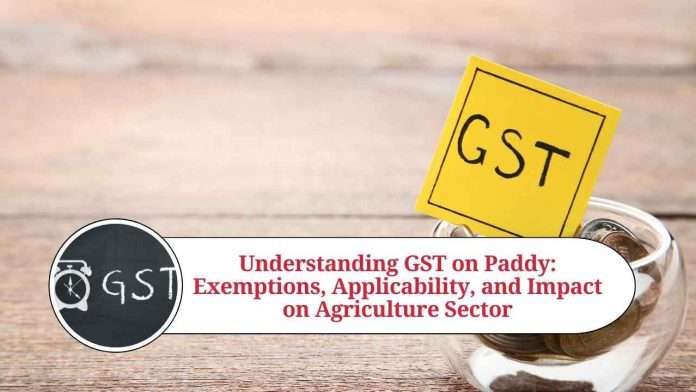The Goods and Services Tax (GST) is a tax reform implemented by the Indian Government in 2017. It replaced various indirect taxes and brought them under a single tax structure. The GST applies to all goods and services sold in the country, including agricultural products like paddy. In this blog, we will discuss the applicability of GST on paddy and its impact on the agriculture sector.
Applicability of GST on Paddy:
Under GST, paddy is classified as a primary agricultural product and falls under the exempted category. The GST is not applicable to the sale of paddy, including its seeds, and other agricultural products like wheat, jowar, maize, bajra, etc. However, if paddy is processed, it attracts GST.
GST on Processed Paddy:
Processed paddy means any paddy that has undergone a process such as parboiling, dehusking, milling, sorting, polishing, or packaging, etc. The processing of paddy adds value to the product and makes it fit for human consumption. Therefore, processed paddy falls under the category of taxable goods and is subject to GST.
The GST on processed paddy is levied at a rate of 5% without input tax credit (ITC). However, if the processed paddy is sold to a registered dealer, the supplier can claim the ITC. In case the processed paddy is exported, it is eligible for a refund of GST paid on the purchase of inputs used for processing.
Impact of GST on the Agriculture Sector:
The implementation of GST has had a mixed impact on the agriculture sector. The exemption of GST on primary agricultural products like paddy has provided relief to farmers as it has reduced the tax burden on them. However, the GST on processed paddy has increased the cost of production, making it challenging for small-scale processors to compete with larger players.
Moreover, the implementation of GST has resulted in the removal of various exemptions and concessions that were available under the earlier tax regime. This has led to an increase in the compliance burden for farmers and small-scale processors.
The implementation of GST has also led to the removal of various state-level taxes and duties, which has streamlined the tax structure and reduced the cascading effect of taxes. This has resulted in the reduction of the overall tax burden on the agriculture sector, making it more competitive.
Moreover, the GST has also facilitated the growth of the organized sector in the agriculture industry. The implementation of GST has made it easier for farmers and small-scale processors to register themselves under the GST regime and avail of various benefits like input tax credit, refund of GST paid, etc.
The GST has also brought transparency and accountability in the agriculture sector. The implementation of GST has made it mandatory for farmers and processors to maintain proper records and comply with the tax laws. This has brought a much-needed accountability in the sector, which was missing earlier.
However, there are still some challenges that need to be addressed. The GST has increased the compliance burden on farmers and small-scale processors. The complex tax structure and the requirement to maintain proper records and comply with various laws have made it difficult for them to adapt to the new tax regime.
Moreover, the GST on processed paddy has increased the cost of production, making it challenging for small-scale processors to compete with larger players. The government needs to take necessary steps to address the concerns of small-scale processors and reduce their compliance burden.
Conclusion
In conclusion, the implementation of GST has brought significant changes in the tax structure of the country. While it has provided relief to farmers by exempting primary agricultural products like paddy, it has also increased the cost of production for processed paddy. The government needs to take necessary steps to address the concerns of small-scale processors and reduce their compliance burden. Overall, the GST has brought transparency, accountability, and competitiveness in the agriculture sector.
Read more useful content:
Frequently Asked Questions (FAQs)
Is GST applicable on the sale of paddy?
Answer: No, GST is not applicable on the sale of paddy as it falls under the exempted category of primary agricultural products.
Is GST applicable on the sale of paddy seeds?
Answer: No, GST is not applicable on the sale of paddy seeds as it is also classified as a primary agricultural product.
What is processed paddy?
Answer: Processed paddy means any paddy that has undergone a process such as parboiling, dehusking, milling, sorting, polishing, or packaging, etc.
Is GST applicable on processed paddy?
Answer: Yes, GST is applicable on processed paddy as it falls under the category of taxable goods.
What is the GST rate on processed paddy?
Answer: The GST rate on processed paddy is 5% without input tax credit (ITC).
Can a supplier claim input tax credit (ITC) on the sale of processed paddy to a registered dealer?
Answer: Yes, a supplier can claim input tax credit (ITC) on the sale of processed paddy to a registered dealer.
Is processed paddy eligible for a refund of GST paid on the purchase of inputs used for processing?
Answer: Yes, processed paddy is eligible for a refund of GST paid on the purchase of inputs used for processing if it is exported.
Has GST reduced the overall tax burden on the agriculture sector?
Answer: Yes, the implementation of GST has reduced the overall tax burden on the agriculture sector by removing various state-level taxes and duties.
What are the benefits of GST for farmers and small-scale processors?
Answer: Farmers and small-scale processors can avail of various benefits like input tax credit, refund of GST paid, etc., under the GST regime.
Has GST increased the compliance burden on farmers and small-scale processors?
Answer: Yes, the implementation of GST has increased the compliance burden on farmers and small-scale processors, making it difficult for them to adapt to the new tax regime.




















